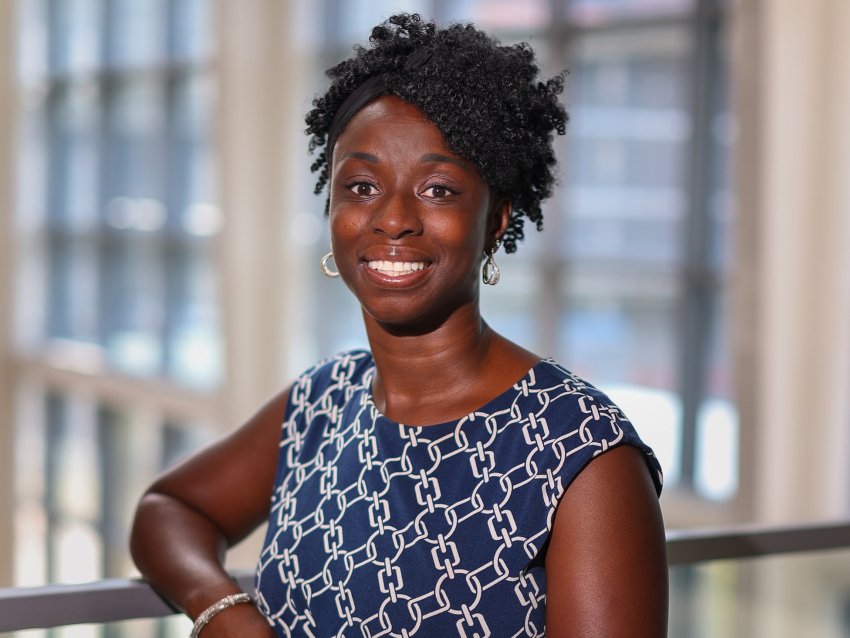
UK levels up opioid misuse prevention with innovative gaming
LEXINGTON, Ky. (Oct. 29, 2024) — With teens spending more time in front of screens than ever before, video games are emerging as a powerful way to teach important life lessons. Olufunmilola Abraham, Ph.D., chair of the Department of Pharmacy Practice & Science at the University of Kentucky College of Pharmacy, is tapping into this trend to address a critical issue: opioid misuse among teens.
With the support of a five-year, $1.9 million grant from the Agency for Healthcare Research and Quality (AHRQ), Abraham is leading an innovative project that leverages the power of gaming to tackle this pressing public health concern. By creating an engaging tool for both teens and their families, the project is designed to bring important conversations about opioid safety to an unexpected but crucial location: the emergency room.
Imagine a teen named Alex who loves gaming. After suffering a sports injury, Alex is prescribed opioids in the ER. Without proper guidance, Alex could be at risk of misuse. That’s where “MedSMA℞T Mobile” comes in — a video game that sparks conversations among teens like Alex, their families and health care providers about the risks and safe use of opioids.
“Video games are a unique way to engage teens in a format they enjoy and understand,” said Abraham. “Through the ‘MedSMA℞T Mobile’ game, we’re making learning fun while also helping families discuss the dangers of opioid misuse and safe use of these medicines.”
The project, “Disseminating and Implementing MedSMA℞T Families in Emergency Departments: A Randomized Control Trial to Assess Effectiveness of an Evidence-Based Gaming Intervention to Reduce Opioid Misuse,” focuses on emergency departments in Wisconsin and Northern Illinois, and has the potential to expand nationwide. Emergency departments treat serious injuries and illnesses, making them key locations where doctors may prescribe acute pain management medications to young adults and teens.
Abraham, who recently joined the University of Kentucky from the University of Wisconsin-Madison, originally developed the MedSMA℞T Families tool at UW-Madison and partnered with the BerbeeWalsh Emergency Department at UW Health on initial testing. Now, her team is expanding its use by making it playable on mobile devices (“MedSMA℞T Mobile”) to improve knowledge about opioid safety among both teens and their parents. The goal is to reduce the risk of opioid misuse and enhance public health outcomes.
“I’m excited to continue this important work at UK and lead efforts to fight the opioid crisis among teens and their families,” said Abraham. “This AHRQ R18 grant allows us to bring ‘MedSMA℞T Mobile’ into emergency care settings where we can have a real impact on how families understand and manage opioid safety.”
Abraham’s team is collaborating with Filament Games, a leader in educational gaming, to develop the mobile version of the MedSMA℞T Families tool. Together, they’re creating an interactive and immersive experience that transforms health education into something engaging and memorable. The tool will be tested in emergency departments to evaluate how much teens and their parents learn and whether it leads to lasting changes in opioid safety habits.
“The project will track what families learn from the game and whether their behaviors around opioid safety improve,” said Allie Hurst, M.D., a pediatric emergency medicine physician at UW-Madison and site principal investigator on the grant. “We’ll also be looking at how practical it is to use the tool in busy emergency care settings.”
R. Kip Guy, Ph.D., dean of the UK College of Pharmacy, highlighted the significance of this work.
“Dr. Abraham’s research is a fantastic example of the innovative, impactful work happening at UK,” he said. “Her efforts showcase how pharmacists play a key role in addressing public health challenges, and we’re excited to see the positive impact this project will have.”
The AHRQ grant aligns with the agency’s mission to improve health care quality and safety, particularly in rural and underserved communities. Abraham’s work underscores the value of evidence-based solutions to real-world problems, bringing cutting-edge research directly into health care settings where it can make the most difference.
Abraham’s expertise in game-based learning and medication safety is nationally recognized. Before joining UK, she was a tenured associate professor at the University of Wisconsin-Madison, where she developed successful programs like MedSMA℞T Families. Major organizations, including the American Lung Association and the American Cancer Society, have supported her research.
As the state’s flagship, land-grant institution, the University of Kentucky exists to advance the Commonwealth. We do that by preparing the next generation of leaders — placing students at the heart of everything we do — and transforming the lives of Kentuckians through education, research and creative work, service and health care. We pride ourselves on being a catalyst for breakthroughs and a force for healing, a place where ingenuity unfolds. It's all made possible by our people — visionaries, disruptors and pioneers — who make up 200 academic programs, a $476.5 million research and development enterprise and a world-class medical center, all on one campus.
In 2022, UK was ranked by Forbes as one of the “Best Employers for New Grads” and named a “Diversity Champion” by INSIGHT into Diversity, a testament to our commitment to advance Kentucky and create a community of belonging for everyone. While our mission looks different in many ways than it did in 1865, the vision of service to our Commonwealth and the world remains the same. We are the University for Kentucky.
